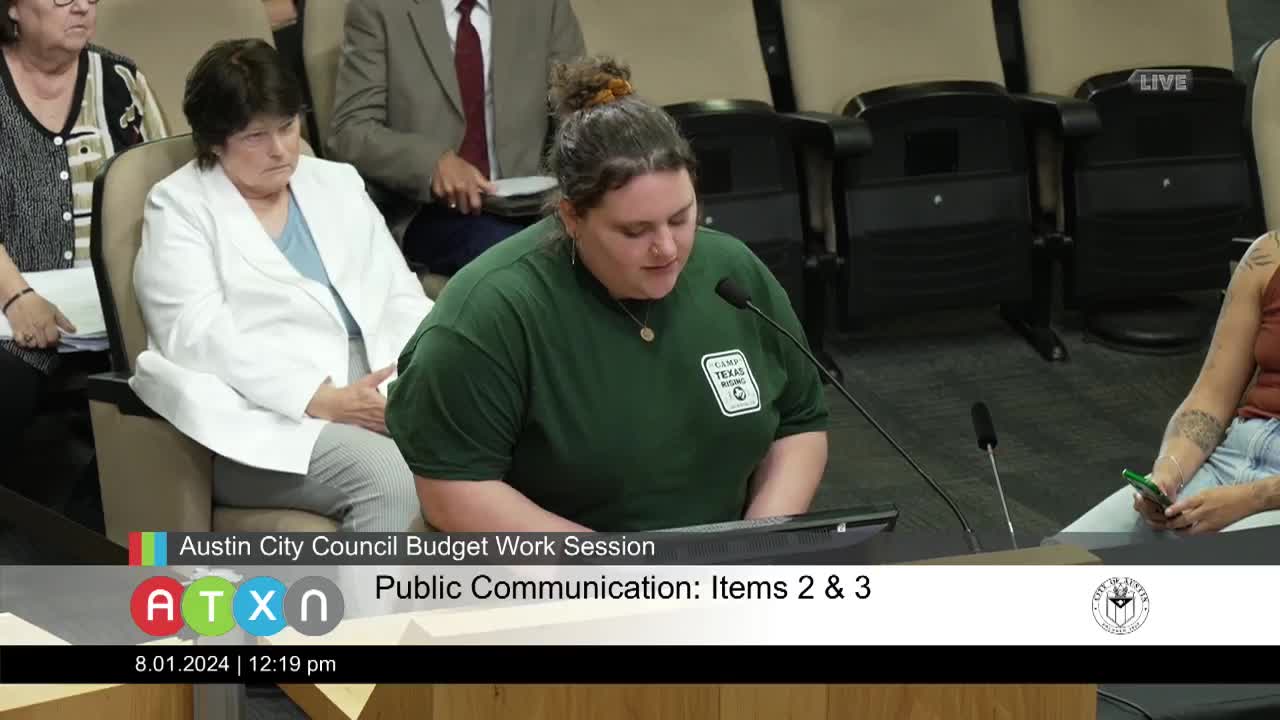City Council Faces Backlash Over Controversial Police Budget Increase
August 01, 2024 | Austin, Travis County, Texas
This article was created by AI summarizing key points discussed. AI makes mistakes, so for full details and context, please refer to the video of the full meeting. Please report any errors so we can fix them. Report an error »

During a recent city council meeting, significant discussions centered around the proposed budget for the Austin Police Department (APD), which includes an additional $18.2 million despite the department currently holding over $10 million in unfilled positions. Critics argue that this funding increase is unnecessary, especially as the police are negotiating a new contract that guarantees $1 million in raises, pushing the total police budget to exceed $500 million.
Local organizations are advocating for a reallocation of these funds towards community support programs aimed at enhancing safety and sustainability. They propose investing in initiatives such as rapid rehousing, harm reduction infrastructure, and the Austin Climate Equity Plan, emphasizing that these programs address the root causes of issues leading to police involvement.
In contrast, supporters of the police budget, including representatives from the Downtown Austin Alliance, argue that adequate funding is essential for recruiting and training officers, as well as for mental health diversion programs that aim to assist individuals with behavioral health issues. They highlight the importance of a well-funded police department in maintaining public safety and supporting broader city initiatives.
The meeting also featured public comments from residents expressing frustration over the city’s handling of various issues, including the management of cemetery contracts and the treatment of citizens at council meetings. One speaker, Sharon Blythe, criticized the city’s approach to community engagement and the perceived lack of support for local initiatives.
As the council deliberates on the budget, the tension between funding law enforcement and investing in community services remains a focal point of public discourse, reflecting broader societal debates on safety, equity, and resource allocation in Austin.
Local organizations are advocating for a reallocation of these funds towards community support programs aimed at enhancing safety and sustainability. They propose investing in initiatives such as rapid rehousing, harm reduction infrastructure, and the Austin Climate Equity Plan, emphasizing that these programs address the root causes of issues leading to police involvement.
In contrast, supporters of the police budget, including representatives from the Downtown Austin Alliance, argue that adequate funding is essential for recruiting and training officers, as well as for mental health diversion programs that aim to assist individuals with behavioral health issues. They highlight the importance of a well-funded police department in maintaining public safety and supporting broader city initiatives.
The meeting also featured public comments from residents expressing frustration over the city’s handling of various issues, including the management of cemetery contracts and the treatment of citizens at council meetings. One speaker, Sharon Blythe, criticized the city’s approach to community engagement and the perceived lack of support for local initiatives.
As the council deliberates on the budget, the tension between funding law enforcement and investing in community services remains a focal point of public discourse, reflecting broader societal debates on safety, equity, and resource allocation in Austin.
Don't Miss a Word: See the Full Meeting!
Go beyond summaries. Unlock every video, transcript, and key insight with a Founder Membership.
✓
Get instant access to full meeting videos
✓
Search and clip any phrase from complete transcripts
✓
Receive AI-powered summaries & custom alerts
✓
Enjoy lifetime, unrestricted access to government data
30-day money-back guarantee

